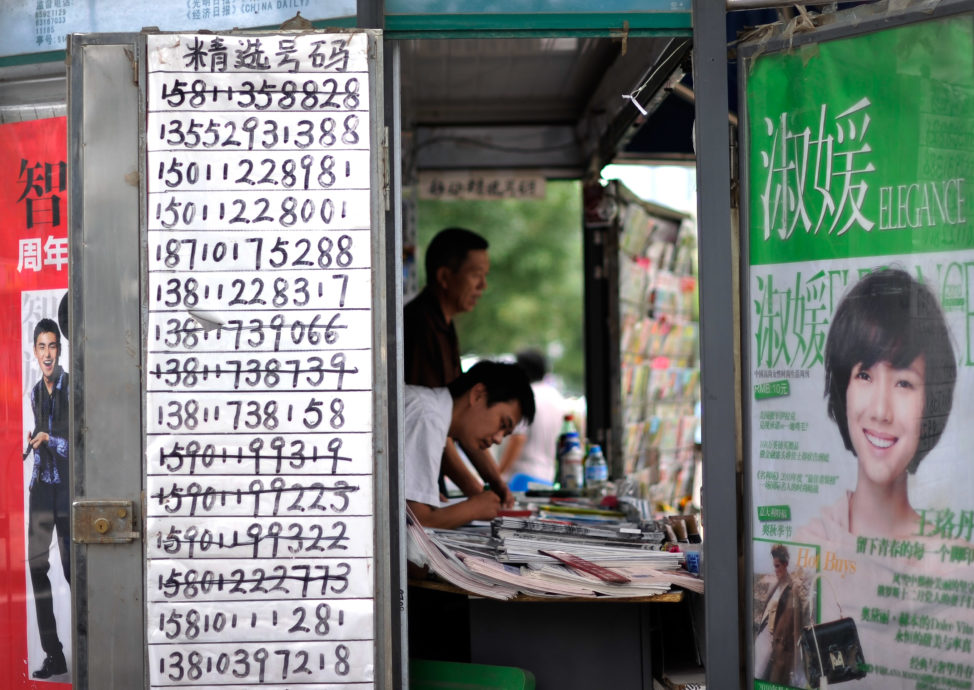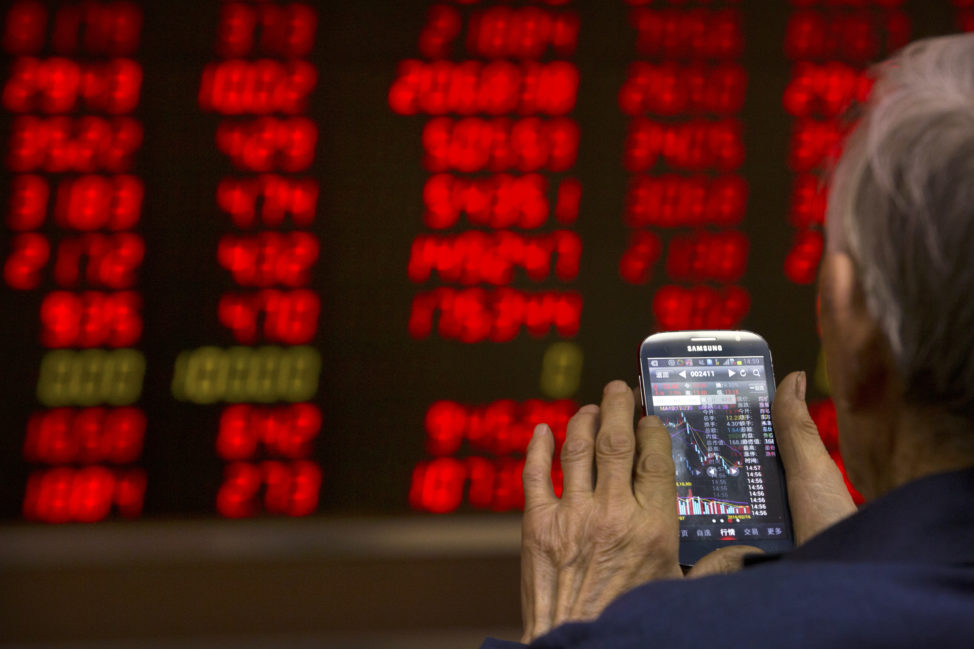
FILE – A vendor browses magazine at a news stand with a paper displaying mobile phone numbers for sale in Beijing, China. (AP)
Cellphone numbers are slowly becoming personal identifiers – a role all-important social security and national numbers have fulfilled for decades. But these mobile gateways to your life are left unprotected in an age of hacking, data mining, and sheer negligence.
For the past 50, 60, 70 years, social security numbers have been the key that private investigators and information brokers used to tap into credit reports, addresses, dates of birth and a whole lot more.
With that kind of data, investigators can run the social security number into different indexes and find out about finances, property ownership, criminal records and more, said Thomas Martin of Martin Investigative Services and author of Seeing Life Through Private Eyes: Secrets From America’s Top Investigator to Living Safer, Smarter, and Saner.
“But now, where’s your identifier? asked cybersecurity expert Shaun Murphy, CEO of sndr.com. “Well, it’s your social media profile. It’s your email. It’s your messaging application. And guess where all those things are? It’s … your phone.”
Traditional wisdom has it that you don’t give your social security number to just anyone because it reveals so much about you. But when asked, many people often freely give away their cellphone number – the “number one gateway to your identity,” as he put it in a chat with Techtonics.
“Your entire life is on your phone,” he stressed. “Most people have their emails, their social media, their pictures, their location-tracking applications – and all these things are on one little tiny spot that fits in your pocket. And someone could grab it out of your pocket very easily.”
Grant permission to an app and it can “listen to your microphone all day” or “potentially steal data off your phone as well,” added Murphy.
“Not too long ago, if a computer program you had on your Windows or Mac desktop would call home or would try to access the internet, we would freak out,” he recalled. “… But nowadays, everything does that. … It is a whole different world.”
Criminals already have figured out that it is far easier to use a cellphone number to get all the data they want than chasing after a social security number. And they are not deterred by two-factor authentication, noted Martin, a former federal investigator.
“Now, the bad guys around the world … and who are hackers, can get your cellphone number and then that is a gateway to your living room,” he told Techtonics. “… Now, I can get into your text messages, your email, your photos, your Amazon account, your credit card information.”
Once they have your phone – and everybody has either ‘1234’ or ‘bingo’ [for passwords], I mean those things are easily obtained, that’s the least of the hackers’ worries – once they have your number, your password is kind of like making oatmeal – Thomas Martin

FILE – A Chinese investor uses his smartphone to check stock prices in a brokerage house in Beijing. (AP)
It could also be a gateway to your bank account. In the age of mobile banking, financial institutions offering these services are not obligated under any “rules or regulations to protect your cell number.”
“Everything that you do with your banking is tied to your cell number,” said Martin. “So once I have your cell number, I can find out your banking. I can find out your bank account, your checking account, your savings accounts, your IRAs, your retirement, I can find all that out. … I’m telling you what the real world is. I’m not telling you that we do that.”
Yet that those same cellphone numbers are compiled and sold by companies making “billions off of the fact that they can gather information about you,” said Murphy.
“They can sell your data,” he said. “… Sure, they’re interested in securing their own interests, but securing you data – well that’s sort of against what their mission is. … It turned out to be an incredible business model.”
“There are no regulations,” added Martin. “There are no rules by the government, by the states, by the cities to make any effort to try and regulate it. … We get many calls from corporate executives or famous people or entertainers who say … somebody got a picture of me through my cellphone and they want $100,000.”
Just this past Wednesday, an Israeli company left up to six million Verizon subscriber records publicly available on a storage server – cellphone numbers, account numbers, names – all available for download with little effort.
Verizon apologized in a statement, but claimed media reports were overstated and that there was “no loss or theft of Verizon or Verizon customer data information.” The statement also noted the server had “a limited number of cellphone numbers for customer contact purposes.”
“The way to solve the problem,” said Martin, ” … is to have two or three phones. I would have one phone that is as clean as Mother Theresa,” he explained. “And that phone would only be used to receive calls and maybe every once in a while to make a call. … And that phone would have no text[ing].”
The other option is to use a prepaid or burner cellphone, where you pay for whatever call you make and dispose of the phone.
“The phone that you have your kids pictures on, your relatives pictures or your texts that are sent to your boyfriend, girlfriend, buddies, friends, neighbors, pictures that you share – all of that is on a separate phone that you never, ever, ever give out,” he advised.
Juggling three phones might be a problem for people who prefer to have all their data on one device, or for 18-23-year-olds who grew up with cellphones and never owned a landline. “Their whole life is in that cellphone,” he said.
This is why Murphy believes people need to be more protective of their devices and smarter about what apps they download, what permissions they give, and who they share their cell number with because their life could be stolen without their knowledge, and they might not even understand the implications of that loss.

4 responses to “Here’s Why You Shouldn’t Give Away Your Cellphone Number”
Microsoft has chosen to integrate the Zune software into the phone, that is mature
and full-featured, having been within the Microsoft
Zune for years. If you want to watch the match by sitting at home, then you can watch it over television. Once somebody will
be able to locate a blog or website of this type, they’ll be able to keep up-to-date
on the latest happenings inside industry.
Is it possible for hackers to take your money in the bank by having your cell number which you use for mobile banking?
It’s possible: http://www.dailymail.co.uk/news/article-2620969/How-thieves-use-mobile-bank-account-dodgy-public-WiFi-connections-bluesnarfing.html.
If you use mobile banking, you should check your activity periodically. Here are a couple of links to help you protect your phone. You can search for more options, so this is a start: http://www.nytimes.com/2012/01/26/technology/personaltech/protecting-a-cellphone-against-hackers.html
And
https://www.forbes.com/sites/learnvest/2017/01/27/7-ways-to-protect-your-private-cellphone-data-from-hackers/#165a681e213f
I only use my cell for my emergencies, and a few of my family are the only ones who have my number, and of course Tracfone, but I am getting loads of telemarket calls every day.